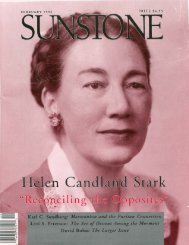00a_cover cmyk dark blue.qxp - Sunstone Magazine
00a_cover cmyk dark blue.qxp - Sunstone Magazine
00a_cover cmyk dark blue.qxp - Sunstone Magazine
You also want an ePaper? Increase the reach of your titles
YUMPU automatically turns print PDFs into web optimized ePapers that Google loves.
S U N S T O N E<br />
into its bitter black. “When I first got up here, I sold stuff doorto-door.<br />
I’d get into this shirt and tie, strap on this huge old<br />
duffel bag full of crap, and hit every store on the street.”<br />
A piece of the world suddenly falls into place for me. I had<br />
always understood the “No Soliciting” signs on private residences,<br />
the ones we missionaries so studiously ignored (“But<br />
we’re not soliciting; we’re not selling anything!”), but not the<br />
ones on businesses. They were to discourage people like my<br />
brother.<br />
“I’d sell books, toys, candy, all this stuff that they could buy<br />
and then sell at a ‘huge profit.’”<br />
pulls from its sleeves.<br />
In fact, as they couldn’t account for him for a few days, the<br />
police wondered if he had been killed in the fire.<br />
“What did you do?”<br />
Ron shrugs and bites off a piece of glistening sausage. “I<br />
lived on the streets.”<br />
“Holy cow!” (I have a wife who keeps me on a Sesame Street<br />
vocabulary, otherwise that quote would have been rated PG-<br />
13.)<br />
This has been a night of revelations. My brother was (1) a<br />
hard sell, (2) presumed dead, and (3) homeless. I look at him<br />
Why is it so hard to look? Perhaps because in the curve of the jaw, the squint of the<br />
eye, the hold of the shoulder, are sown pieces of you. There are a million filaments<br />
connecting you two, and when either of you change, there’s a pull.<br />
PHOTO: STAGE THIS<br />
“So you’d just go into these stores. . . ”<br />
“And I’d dump my crap on the counter and talk and talk<br />
and talk.” He takes a test sip of the coffee. “Man, I was a hard<br />
sell.” A glint of bemused pride flashes in his eye.<br />
I try, but I just can’t picture Ron as a hard sell.<br />
“It wasn’t easy,” he says. “It was totally against my personality,<br />
but I had to do it. I had to survive.”<br />
Over a plate of sausage and eggs advertising the joys of<br />
trans fats, he tells me about the time he drove a supervisor to<br />
Montana, not realizing that his supervisor was leaving his wife<br />
to hook up with another woman.<br />
“’Course, when I got home, I found out my apartment<br />
building burned down. Everything I had was gone. My<br />
posters. CDs. Guitar.” Ron shrugs his shoulders after the<br />
manner of one who has ceased being surprised at the cards life<br />
a little harder. Though I’ve been staying with him for the past<br />
four days, I haven’t really looked at him. I’ve kept my childhood<br />
image of him in front of his face all this time.<br />
I start to piece together his new face. A wispy Zen master<br />
goatee flows from the chin, eyes the same grandfather brown,<br />
but face leaner. Lips, curling next to each other as if for<br />
warmth, still occupy only a tiny space above the chin.<br />
Why is it so hard to look? Perhaps because in the curve of<br />
the jaw, the squint of the eye, the hold of the shoulder, are<br />
sown pieces of you, bearing fruit you had never conceived of.<br />
There are a million filaments connecting you two, and when<br />
either of you change, there’s a pull.<br />
The whole world is being dragged out from under me.<br />
Right here in Shari’s Diner. Maybe I’ll need more than just this<br />
strawberry milkshake.<br />
PAGE 52 SEPTEMBER 2006

















